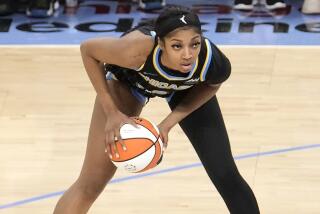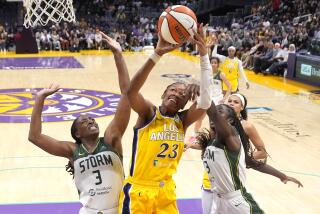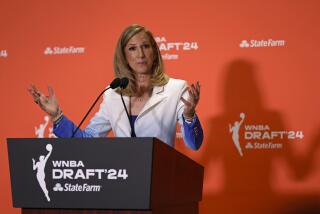Column: WNBA at 23 has labor issues, but also a new boss and a plan to stand alone
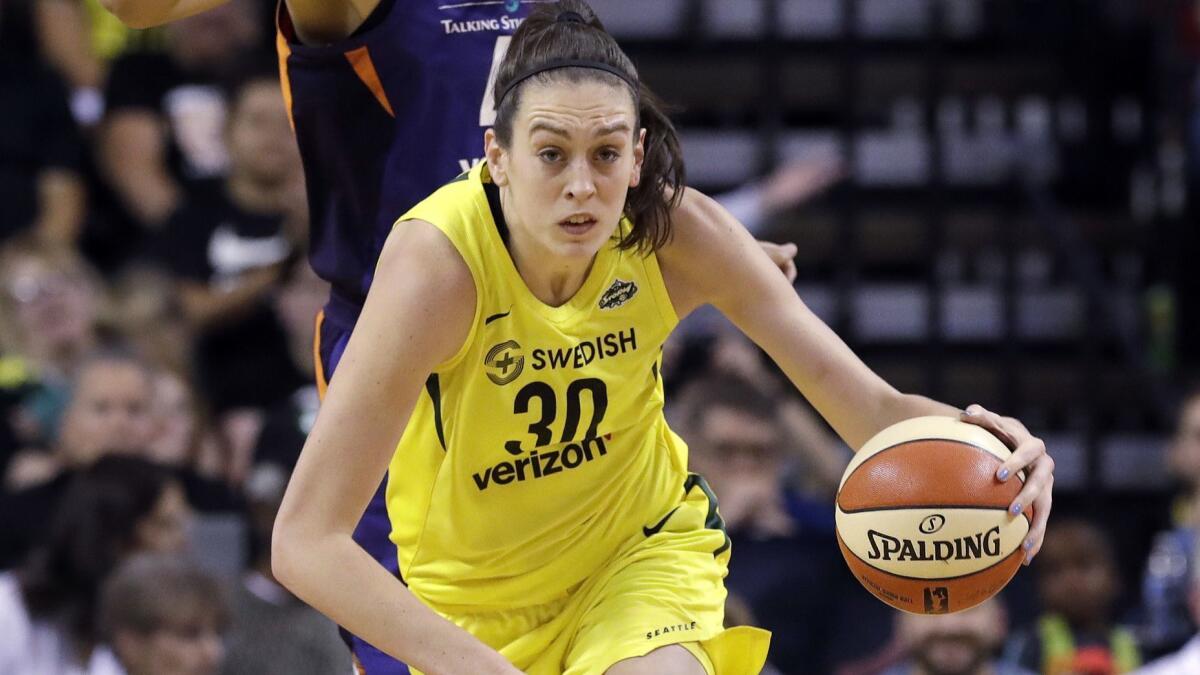
Terri Jackson remembers being confused as she got off the train on the way to see her first New York Liberty game. She had plugged the address of the Westchester County Center into her phone but saw nothing to indicate a WNBA arena was nearby. She wondered if she’d gotten lost.
“The map is telling me ‘keep walking,’ ” said Jackson, the executive director of the Women’s National Basketball Players Assn. “As I approached it, the signage outside the facility, I think, was announcing a reptile show or something. It wasn’t a Liberty game. I’m, ‘Oh my goodness, is this what it’s come to?’ I was disappointed.”
The WNBA has experienced the franchise moves and failures that historically have affected sports leagues in their early years and still faces unhappy circumstances like those that have shunted the Liberty to substandard facilities, but it has come a long way as it prepares on Friday to begin its 23rd season with games in Atlanta and New York.
It has a new logo — the silhouetted player wears her hair in a bun instead of a ponytail and has been freed from the artist’s box that confined her — and a new agreement with CBS Sports Network to go with its ESPN rights deal. After being run by four presidents, it will have a commissioner when Cathy Engelbert, chief executive of the professional services firm Deloitte, takes office on July 17. The title is significant because it puts her on par with heads of the other major North American professional sports leagues.
Engelbert, who played college basketball at Lehigh, said during a conference call last week she saw “a lot of opportunity to bolster visibility for this sport and give it the cool factor that it deserves. … I think there’s really an opportunity to build the WNBA into a thriving business.”
No one before her has found a successful formula. The WNBA is still searching for enough backing from fans and sponsors to loosen its ties to the NBA, which partly owns and supports it. “I think that’s probably one of the reasons I was selected for this role, to come in and bring a business plan to build the WNBA into a real business and a thriving business, quite frankly,” Engelbert said.
If not her, and if not now, will the WNBA ever become self-sustaining?
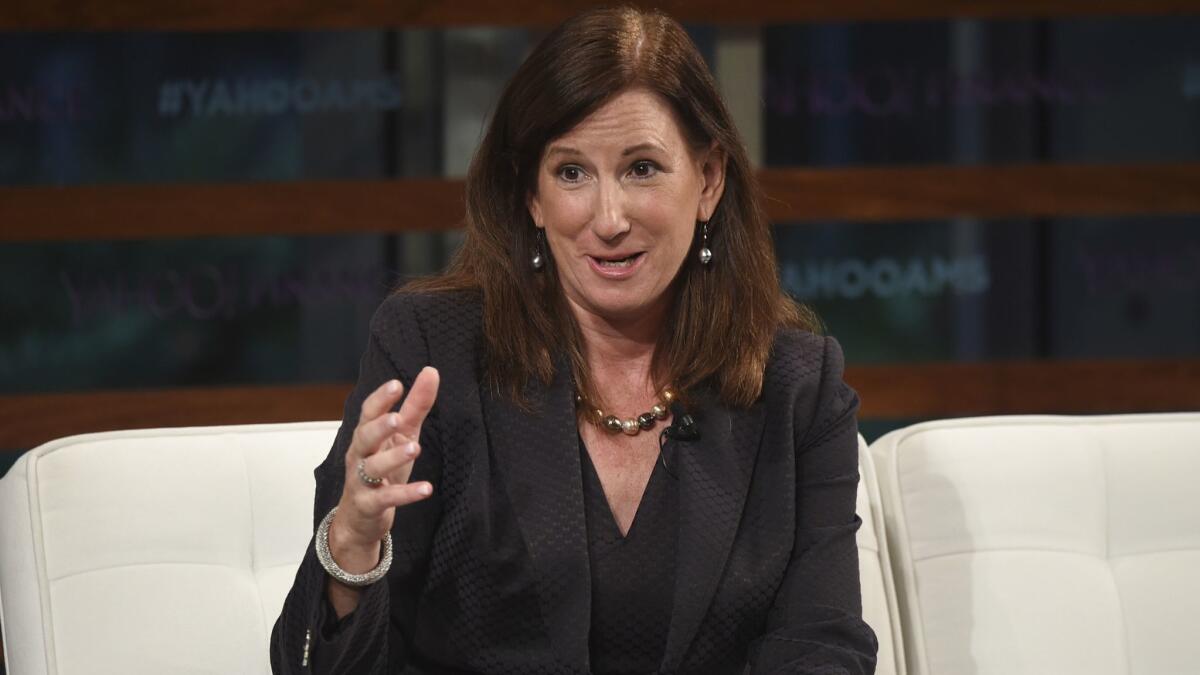
The league has reached a crucial moment. Its announced attendance average fell from 7,716 in 2017 to 6,768 in 2018, partly because the Liberty left Madison Square Garden for its 5,000-seat home in Westchester.
WNBA players — including many who supplement their earnings by playing in Europe and, as a result, risk incurring wear-and-tear injuries — opted out of their collective bargaining agreement with the WNBA. The CBA will expire on Oct. 31, or the day after the final playoff game.
Among the WNBA stars who begin the season injured after playing overseas include Seattle forward Breanna Stewart, the defending champion’s reigning MVP. She tore her right Achilles’ tendon playing for Russia’s Dynamo Kursk in the Euroleague title game.
“The players are all in. Always have been,” Jackson said. “The more you invest in the players and professionalize the league, the more it will grow.”
They’re among a wave of female professional athletes pursuing improved pay and working conditions. In March, 28 members of the U.S. women’s soccer team filed a gender discrimination lawsuit against U.S. Soccer; in early May, more than 200 female hockey players announced they wouldn’t play professionally until they got the resources they felt they deserved. Some were paid as little as $2,000 to play in the National Women’s Hockey League, which isn’t affiliated with or funded by the NHL. The women hockey players last week filed articles of incorporation to form the Professional Women’s Hockey Players Assn.
The salary cap for each WNBA team is $996,100 this season. The maximum player salary is $127,500, with a minimum of $41,965. But besides higher salaries and a bigger share of revenues — Forbes has estimated players get about 22% of league revenues — Jackson said players were concerned about health and safety issues and creating a sustainable business model.
“It’s not just about what the players can achieve for themselves right now, immediately,” she said. “It’s about how to protect, be the caretakers, of this legacy, because they see themselves as responsible for ensuring that their sisters — the young girls and young women coming behind them — have this league as something to aspire to and have it at a far higher level than where it is right now.”
The NBA has been patient in funding the WNBA. It can afford to be. It has deep pockets, and its losses can be written off in the name of supporting diversity. Speaking to Canada’s CBC network, NBA Commissioner Adam Silver acknowledged he felt “a bit of an obligation” to keep the WNBA going. But at some point, NBA owners — his bosses — might put the bottom line ahead of sentiment.
“I think we can never look at sports as just any other business. Because frankly if it were any other business, the WNBA probably would not still be in business because the people making the investments would say, ‘We’ve been at this for a long time. We’re not making money yet,’ ” he said.
Sign up for our daily sports newsletter »
“With the WNBA, I think in many ways we were way ahead of our time because it’s just now we’re beginning to see the mainstream acceptance of professional women’s sports, and ultimately if it’s going to be a business, that’s required because you need people to buy the tickets and buy the merchandise and watch it on television.”
Whether there’s enough interest to sustain a women’s pro league remains the issue. Engelbert and Jackson see promotional efforts that could be made and markets that can be tapped. Engelbert, whose place in labor talks will be taken by NBA Deputy Commissioner Mark Tatum until she takes over, mentioned targeting millennials and digital natives. Jackson, who praised Engelbert’s business savvy and said the union was involved in the hiring process, cited digital media, gaming and women-centric businesses as potential revenue sources.
“Until now, I think this has been a league that has been on autopilot. That was my impression when I started in this role three years ago this month, and that’s my impression now,” said Jackson, whose son Jaren Jackson Jr. of the Memphis Grizzlies was named to the All-Rookie team. “Until now, it has struck me as a league that has been understaffed, perhaps under-resourced, without an intentional plan to be great. And I say ‘until now’ because I think we are in a very different place right now.
“We may sit on opposite sides of the table — the players and I on one side, the league and the team owners on the other — but we can all agree that we can’t continue to do business like this is the league of 20 years ago or even 10 years ago. And now’s the time to turn the corner. And what better time than right now?”
If not now, when?
More to Read
Go beyond the scoreboard
Get the latest on L.A.'s teams in the daily Sports Report newsletter.
You may occasionally receive promotional content from the Los Angeles Times.
